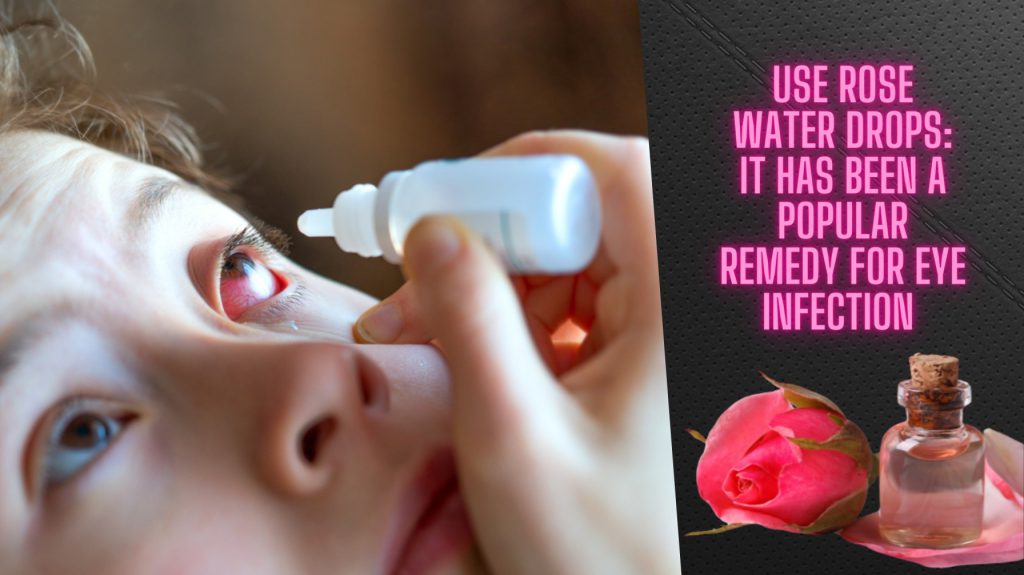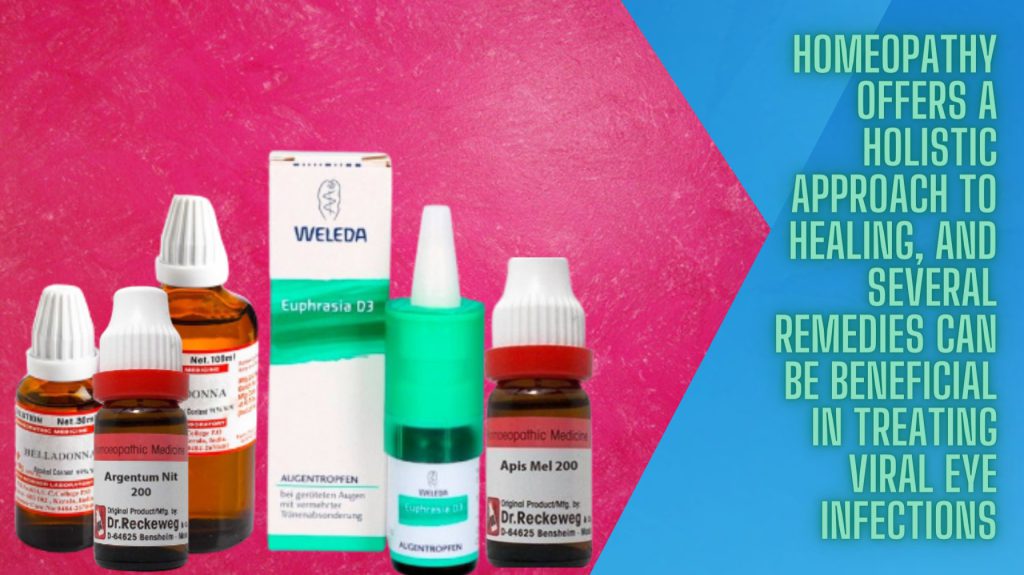Viral eye infections can cause discomfort and irritation, but there are natural remedies that may help alleviate symptoms and promote rapid recovery. In this article, we will explore the benefits of using rose water drops and certain homeopathic medicines to manage and prevent viral eye infections.
Rose Water Drops: A Soothing Solution
Rose water has been a popular remedy for various eye conditions due to its soothing and anti-inflammatory properties. It can provide relief from redness, itching, and discomfort caused by viral eye infections. Here’s how you can use rose water:

- As a Treatment (Every 2-3 Hours): Apply a few drops of pure rose water directly into your infected eye(s) every 2-3 hours. This can help reduce inflammation and relieve symptoms.
- As a Preventive Measure (Once Daily): For those who are not infected but want to take precautionary measures, using rose water once daily can help maintain eye health and reduce the risk of infection.
Homeopathic Medicines for Viral Eye Infections:
Homeopathy offers a holistic approach to healing, and several remedies can be beneficial in treating viral eye infections. Here are some commonly recommended homeopathic medicines:
- Belladonna 200: This remedy may help reduce eye redness and inflammation. Take Belladonna 200 every 3 hours orally.
- Euphrasia 200: Euphrasia is often used for eye conditions with profuse, watery discharge and burning sensations. Take Euphrasia 200 every 3 hours orally.
- Argentum Nitricum 200: Argentum Nitricum may be useful for eye infections with sticky or purulent discharge. Take it every 3 hours orally.
- Apis 200: Apis is recommended for swollen and puffy eyelids, especially when accompanied by stinging or burning sensations. Take Apis 200 twice daily orally for four days.

Where to Find Homeopathic Medicines:
You can purchase these homeopathic medicines from reputable homeopathic medical stores or well-known pharmacies such as Clinix and Fazal-Din.
Conclusion:
While rose water and homeopathic remedies can offer relief and support in the treatment of viral eye infections, it’s essential to consult with a healthcare professional before starting any treatment regimen. Additionally, these natural remedies should complement conventional medical treatment, not replace it. If you or someone you know is experiencing symptoms of a viral eye infection, consult a healthcare provider for a proper diagnosis and treatment plan.
By incorporating these natural remedies and seeking professional guidance, you can work towards alleviating the discomfort of viral eye infections and promoting a faster recovery. Remember to prioritize eye health and take steps to prevent infection whenever possible.
Precautionary Measures to Prevent Viral Eye Infections
Precautionary measures to avoid viral eye infections are essential to maintain good eye health. Here are some steps you can take to reduce the risk of contracting a viral eye infection:
Hand Hygiene:
- Wash your hands thoroughly with soap and water for at least 20 seconds, especially before touching your face, eyes, or handling contact lenses.
- Use hand sanitizer with at least 60% alcohol if soap and water are not readily available.
Avoid Touching Your Eyes:
-Avoid touching your eyes with unclean hands.. Your hands can carry viruses and bacteria that may cause infections.
Personal Items:
- Do not share personal items such as towels, makeup, eye drops, or contact lenses with others.
Proper Contact Lens Care:
- If you wear contact lenses, follow strict hygiene practices:
- Cleanse your hands before touching your lenses.
- Clean and disinfect lenses as directed by your eye care professional.
- Replace contact lens cases regularly.
- Remove your contacts before swimming or showering to avoid waterborne contaminants.
- Use protective eyewear, such as safety goggles or sunglasses, in environments where there is a risk of eye exposure to harmful substances or infectious agents, especially if you work in healthcare, labs, or construction.
Avoid Close Contact with Infected Individuals:
- If someone around you has a viral eye infection, maintain a safe distance and avoid close contact, including sharing personal items.
Maintain Good General Health:
- A strong immune system can help prevent infections. Eat a balanced diet, exercise regularly, get enough sleep, and manage stress to support your overall health.
Avoid Rubbing Your Eyes:
- Frequent eye rubbing can introduce pathogens to the eyes. If your eyes feel itchy or irritated, use a clean tissue or eye drops to alleviate discomfort.
Stay Informed:
- Be aware of common viral eye infections, their symptoms, and transmission methods. Vaccinations:
- Some viral infections, such as viral conjunctivitis caused by adenoviruses, can be prevented through vaccinations. Consult with a healthcare professional about vaccination options.
Travel Precautions:
– If you’re traveling to areas with a high prevalence of infectious diseases, take extra precautions to protect your eyes, including wearing sunglasses and avoiding contact with potentially contaminated surfaces.
Frequent Cleaning and Disinfection:
– Regularly clean and disinfect commonly touched surfaces, like doorknobs and light switches, to reduce the risk of cross-contamination.
By following these precautionary measures, you can significantly reduce your risk of contracting viral eye infections and maintain good eye health. If you suspect you have an eye infection or experience symptoms like redness, discharge, pain, or vision changes, seek prompt medical attention from an eye care professional.
Leave a Reply